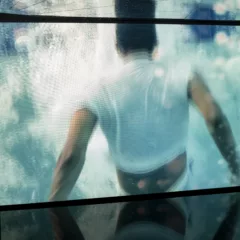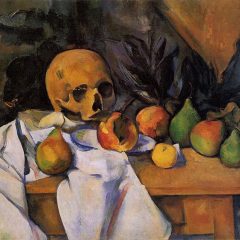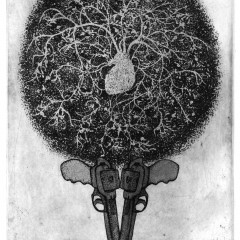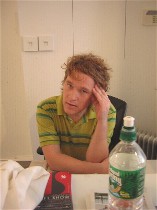 With its themes of crossing borders and power–political and personal–photographer and videographer Phil Collins’ star is ascendant in the art firmament right now. His show, “Assume Freedom,” is up at Temple Gallery until Nov. 5.
With its themes of crossing borders and power–political and personal–photographer and videographer Phil Collins’ star is ascendant in the art firmament right now. His show, “Assume Freedom,” is up at Temple Gallery until Nov. 5.
Roberta and I were hanging around the gallery, there to allow Collins to slap us and then take our pictures–part of a series with art critics and curators. I really don’t know what possessed me to agree to get slapped. I don’t like pain, humiliation, loss of control. But there I was, following Arcadia University’s gallery director Richard Torchia and preceding CFEVA’s Michal Smith and then Roberta. Conkelton said 14 or 15 had signed up.
I suppose one reason I agreed to do this was the adventure. And then there was the chance to get behind the art. It turned out to be more like participating in a performance rather than getting a behind-the-scenes, get-the-skinny experience. Conkleton’s letter of invitation to participate stated, “The portrait session offers a chance to collaborate with Phil, gain insight into his way of working, and perhaps be included in the published body of work.”
I bit. I got slapped. Hard. I never got slapped so hard in my life. It shook my brains, or what’s left of them. It shocked my system. I burst out laughing. (In fact, it was only the second time in my life that I got slapped, the first time being as a teenager, by my mother; I must have done something very bad, but all I remember is the slap).
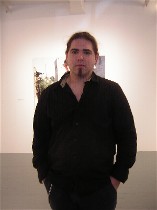 Laughter is great. What better way to shake off an experience that’s hard to take in, and what better way to retain control in a situation I was not controlling? I thought I’d be angry. I wasn’t. Merely stunned.
Laughter is great. What better way to shake off an experience that’s hard to take in, and what better way to retain control in a situation I was not controlling? I thought I’d be angry. I wasn’t. Merely stunned.
In the process of warming his way up to the slap, Collins is solicitous, calming, reassuring–he’d be a great dentist. To numb the pain, Collins even offers a glass of wine (I said no, but Torchia and Conkleton went for it). Collins, born in England in 1970, has a mop of tousled red hair and a puppy-in-the-window sweetness, charm and humor that blend well with his street-urchin demeanor.
Besides Collins’ charm, the other thing that kept me from being too suspicious was the presence of another person in the room, Tyler photography major Ron Bowser (image above right).
Collins said in a woeful tone just prior to the deed that the slap will hurt him more than it would hurt me. At first I thought this was silly, just Borscht Belt comedian schtick, but by time I left the gallery, I accepted it as true. I think Collins really likes people, and I think by time he gets around to the actual slap–are you ready, one two three–he’s hitting someone with whom he has established some initial level of a relationship. So he’s conflicted by time he delivers the blow.
My brain raised the spector of Marina Abramovic for comparison and then rejected her. Unlike Abramovic, Collins is not after some transcendent state through self-flagellation. He’s reaching out beyond his own being.
But he’s thinking about who’s in charge. There’s power in play. I’m reminded of Diane Arbus and the archival footage re-edited by post-colonial artists Yervant Gianikian and Angela Ricci Lucchi to reveal the racist eye behind the lens (see posts here and here).
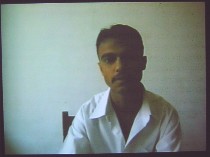 Oh, the work is post-Colonial, heading out to the Earth’s trouble-spots to establish relationships of his own.
Oh, the work is post-Colonial, heading out to the Earth’s trouble-spots to establish relationships of his own.
For all that, it’s still colonial. The photographer is almost always colonial. And his subjects are his native specimens. The teddy-bear affect that Collins gives off, the quick, trusting relationship he establishes (oh, Arbus did this too, don’t forget) can’t quite overcome the fact that he’s the man behind the lens. He’s studying the inequality in the relationship, and his sympathy cannot totally trump his power.
There’s lingering colonialism in his going into places like Palestine, Serbia and Baghdad, and videotaping people in acts Collins describes as collaborative. In the 4-minute interminable Baghdad video portraits a la Warhol (image left above), the cultural difference makes the subjects seem like victims of a practical joke. By the way, I saw this work before I collaborated in getting slapped.
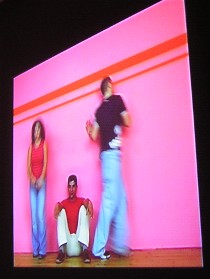 The dance marathon videos, featuring Palestinian youths who range from uncomfortable to graceful to exhausted, show them as Western and just like us at the same time that they seem to me to be vulnerable in a way that makes me squirm. Vulnerable is good if you’re showing feared people. Vulnerable is bad if you’re showing reviled people. Both these things are going on at once in this video.
The dance marathon videos, featuring Palestinian youths who range from uncomfortable to graceful to exhausted, show them as Western and just like us at the same time that they seem to me to be vulnerable in a way that makes me squirm. Vulnerable is good if you’re showing feared people. Vulnerable is bad if you’re showing reviled people. Both these things are going on at once in this video.
Part of how Collins operates is he sets up a seduction of easy friendship and then betrays his subject. It’s not that different from politics and international relations.
The show includes three slap portraits as well as the videos and other portraits.
The work reflects the seduction and power of our culture, our news gathering and information disseminating systems, and ourselves. There’s plenty to think about.
Collins will speak tonight, 6 p.m., at the Arden Theater, 40 N. 2nd St.collins, phil


